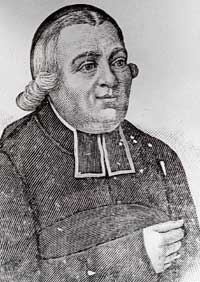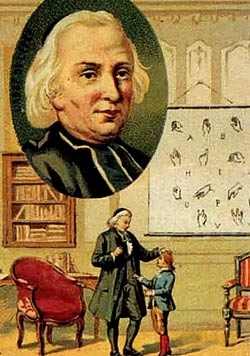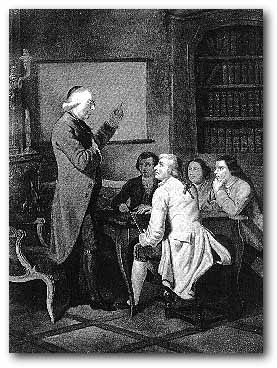In 355 BCE, the Greek Philosopher Aristotle had written that “the deaf were senseless and incapable of reason”. This prejudice continued for more than a millennium until in 1500, a physician, Girolama Cardano, proved through a study, that they could reason. Throughout Europe though, edicts prevented them from marrying, owning property, and receiving even minimal educations. Charles Michel de L’Epee showed his dedication to the hearing-impaired through selflessness, understanding, and inspiration towards equality for them proving that he deserves the title of hero.
 |
| ABBE CHARLES MICHEL DE L'EPPE (http://www.pbs.org/wnet/soundandfury/culture/dhpop/popup6.html IMAGE CREDIT: NATIONAL ASSOCIATION OF THE DEAF) |
Charles Michel de L’Epee was born in the city of Versailles, France, on November 25, 1712. He studied theology as a teen, but refused to sign the formulaire denouncing taking the sacrament of Holy Communion so frequently as a French Catholic. The Archbishop of Paris declined to ordain him since all priests were expected to sign a condemnation of it with the reform movement called Jansenism. Instead, he decided to study law and he was admitted to the Bar. Another bishop agreed to ordain him later, but when this patron died, Epee returned to Paris and lived a life of ease there. Through Father Vanin, Epee met two twin girls who had been deaf since birth, and when the fellow cleric died unexpectedly, Epee agreed to tutor them. He quickly achieved measurable success when teaching the twins, using a form of hand signals that substituted the sounds of the alphabet. These signs soon became a standard language Epee taught. In 1755, he founded his school for the deaf in Paris. The French government formally took over Epee’s school as the Institution Nationale des Sourds-Muets a Paris shortly before his death. On December 23, 1789, Epee died a virtual pauper in Paris.
 |
| ( |
Charles Michel de L’Epee focused on his students which shows self-sacrifice. In order to promote education, “he funded the first public school for the hearing-impaired with his modest inheritance” (“Epee, Charles Michel de l’ (1712-1789)”). Epee invested money so that a school would also teach deaf children from families that couldn’t afford an education. Democratically, “He did not hope to enrich himself by reserving his methods for the deaf and mute of Europe's upper classes, but instead impoverished himself to teach children from all walks of life” ("Charles Michel de l' Epee." Encyclopedia of World Biography). He did not consider status important since he wanted every child to have an equal opportunity to learn even though he would not be benefited to the greatest extent. Selflessly, “Despite his renown, he had bankrupted himself for his cause. Students reported that he went without heat in his own quarters so that they might have a fire in theirs” ("Charles Michel de l' Epee." Encyclopedia of World Biography). He gave up his life of comfort which shows he is dedicated concentrating on his school and students more than himself.
 |
| (http://www.yanous.com/tribus/sourds/sourds011221.html) |
The teaching methods of Charles Michel de L’Epee were effective due to his understanding and connection with deaf people’s point of view. For instance, “Epee’s true breakthrough in deaf education was his assertion that deaf people must learn visually what others acquire by hearing” ("Charles Michel de l' (1712-1789)”). This shows that he is clearly receptive of the viewpoints of the hearing-impaired with their senses which allows him to educate successfully. Epee explained, “Every deaf-mute sent to us already has a language,” he wrote. “He is thoroughly in the habit of using it, and understands others who do…We want to instruct him and therefore to teach him French…By adopting his language and making it conform to clear rules, will we not be able to conduct his instruction as we wish?” (“Charles Michel Epée, Abbé de l'." Biographies). Epee “devoted his life to developing the world’s first sign alphabet for the deaf” (“Epee, Charles Michel de l’ (1712-1789)”). He spent his time creating a logical method of teaching the hearing-impaired French in which he claimed, the “natural language” for the deaf (“History of Sign Language”). Conflicting, “Despite his achievements, some critics asserted that Epee’s pupils learned by rote, and did not possess a true understanding of language or an ability to formulate sentences on their own.” He strove to answer to “those theologians…” Epee wrote, “who held that metaphysical ideas were inexpressible by deaf signs and hence necessarily beyond the understanding of the deaf” (“Charles Michel de l’Epee.”). He did not doubt their abilities but recognized their true potential with knowledge. For example, one deaf student, Clement de la Pujade, was renowned for his delivery of a five-page discourse in Latin and discussion on the history of philosophical thought, which allowed Epee to prove his detractors wrong with tenacity.
His fairness towards them had the ability to influence others to recognize the deaf as citizens with complete rights. As he wrote in his 1784 book, La veritable maniere d’instruire les sourds et muets, confirmee par une longue experience (The True Method of Educating the deaf, Confirmed by Much Experience), “destitute class of persons who, though similar to ourselves are reduced, as it were, to the condition of animals…that I consider it an absolute obligation to make every effort to bring about their release from these shadows” (“Charles Michel de l’Epee.” Encyclopedia of World Biography). He strongly felt as though it was necessary to involve them in society with privileges. Epee asserted as, “one of the first…that the deaf were fully functioning citizens of society, and should be accorded every right granted to the non-hearing impaired” (“Charles Michel de l’Epee.” Encyclopedia of World Biography). He declared that they deserve full liberties with their ability to participate. Impelling, “For this he is recognized as single-handedly bringing the deaf community into their own social class” (“Charles Michel de l’Epee.” Encyclopedia of World Biography). Epee’s influential aptitude to give the deaf public their own social position as accepted citizens makes him an inspiration. Charles Michel de L’Epee earned the status of hero with his selflessness, understanding and equality towards the hearing-impaired which verifies his constant support.
Page created on 5/17/2010 12:00:00 AM
Last edited 1/6/2017 8:43:18 PM
